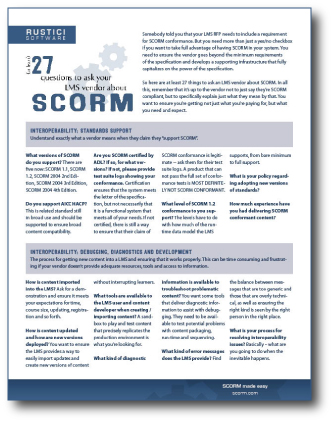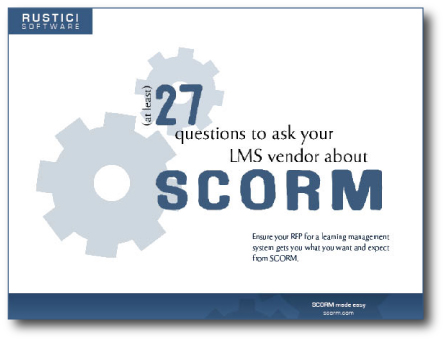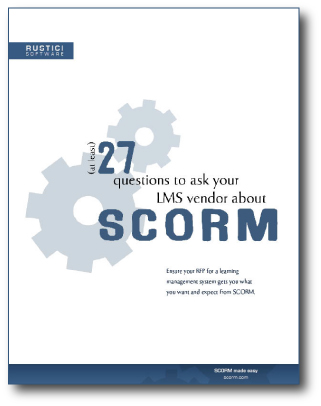SCORM for RFPs for LMSs
What to ask for in your RFP for a learning management system to ensure SCORM is what you want, need and expect
Issuing an RFP for a new learning management system?
Sorry to say this, but if you’re planning to include a requirement for SCORM in that RFP, you need more than just a checkbox asking “Are you SCORM conformant?” If you need SCORM in your LMS, you need to ask a lot more questions (we’ve got at least 27!) to ensure the learning management system you get delivers what you expect.
We see a lot of SCORM implementations here – the good, the bad and the down-right ugly – and know that some of the problems encountered could be avoided by asking the right questions when you purchase your LMS. Our philosophy revolves around ensuring true interoperability, which means going beyond the letter of the SCORM specification to create a system that can handle whatever is thrown at it.
We’ve come up with at least 27 questions you should ask your LMS vendor (download the complete set with full discussion below). Here are the seven most critical:
Question one: What versions of SCORM do you support?
There are five versions of SCORM right now – 1.1, 1.2 and 2004, second, third and fourth editions. The most widely adopted is SCORM 1.2, so you’ll want that version at a minimum. SCORM 2004 adds some great functionality but it’s not quite as commonly used. Yet.
Question two: Are you SCORM certified? If not, please provide test logs.
Certification is a bit of a process, and nice to see, but not critical. If the LMS is not certified, there is still a way to ensure that their claim of SCORM conformance is legitimate, ask them for their test suite logs. Certified products are those products that have been tested by independent ADL Certification Testing Centers. ADL tracks companies that are SCORM certified and you can find a list and more info on their website.
BIG NOTE: If they can’t pass the Conformance Test Suite, they are MOST DEFINITELY NOT SCORM CONFORMANT. The LMS might be SCORM-ish, SCORM-like, SCORM-y or SCORM-ified but it is not SCORM conformant. Implementations like this are the most dangerous. We’re talking unending compatibility problems for you and lots of headaches for us because it gives people cause to complain about SCORM generally. If there’s nothing else you get out of anything I say, please demand that the vendor provide some kind of proof of their SCORM conformance.
Question three: What’s the experience like for the user?
You’re going to want to play with the LMS a bit and you’re looking for quite a few things here. How many windows does the LMS open? Does it provide progress and status updates to the learner? Is the course menu easy to understand and navigate?
Question four: How does data reported via SCORM feed into the rest of the system?
You want to ensure the system does more than just mark things as completed; you want it to put the data where you expect it to go.
Question five: What reports are available to extract SCORM data?
SCORM can provide a wealth of data about what a learner does in a course, but it’s up to the LMS to keep the data and use it. You’ll want to know what kind of reports there are, how data is tracked and what the learner sees at a minimum.
Question six: What tools are available to LMS users and content developers when creating/importing content?
You’ll want a sandbox to play and test content. But ensure it that it precisely replicates the production environment or it won’t be that helpful.
Question seven: Does the LMS require Java applets or other plug-ins be available in the browser?
These can create huge support headaches and are notorious for causing compatibility problems. SCORM requires JavaScript, not Java.
(At Least) 27 Questions You Should Ask
So those are the seven most critical questions you should ask your LMS vendor, but there are many more to explore. We have (at least) 27 we’ve compiled, complete with more in-depth discussion than we’ve done so far here.
We’ve set up the information in a few different ways to make life easier for you. These are all issued under a Creative Commons license so feel free to share them with anyone via email or printout, just don’t change them in any way.

One-Page Handout – quick run-through the questions with minimal explanation. Great handout to start the conversation.

All the questions
e-Book – All the questions and complete discussion, formatted to make it easy for reading on the screen. All the questions and complete discussion, formatted to make it easy for reading on the screen.
White Paper – All the questions and complete discussion, formatted for printing to take with you to read anywhere.All the questions and complete discussion, formatted for printing to take with you to read anywhere.
So, what do you think?
Did we get this right? Did we miss anything? Speak up and let the world know!
